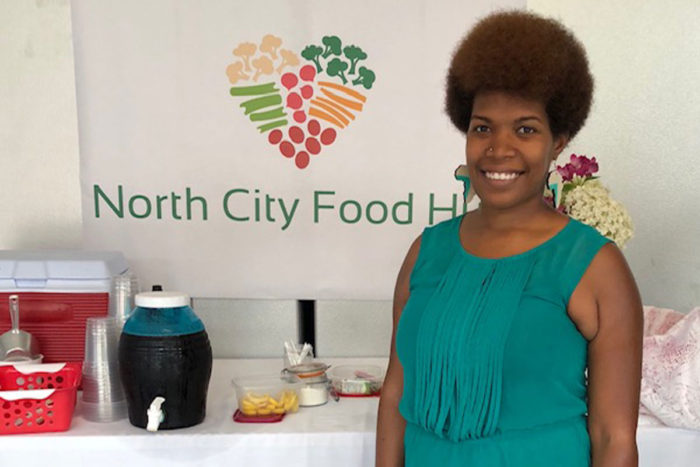IPH conference to address health in rural and urban communities
Alayna Sibert, of North City Food Hub, will discuss limited access to food in urban neighborhoods
 Lucille Sibert
Lucille SibertAlayna Sibert, operations manager for North City Food Hub, will talk about limited access to healthy, affordable food in many neighborhoods in St. Louis and St. Louis County at the annual conference of the Institute for Public Health (IPH) at Washington University in St. Louis. The conference will be held from 8 a.m. to 1 p.m. Oct. 31 in the Eric P. Newman Education Center on the Medical Campus.
When Alayna Sibert arrives for work at the North City Food Hub in St. Louis’ Vandeventer neighborhood, she is motivated by conditions she observed while growing up in the area. Her family was fortunate enough to have a car for trips to a grocery store, but many of her neighbors walked or took public transportation to the corner store to purchase milk, eggs and bread. These businesses did not sell fresh fruit or vegetables. And most restaurants in her neighborhood sold food that was mostly high in fat and low in nutrients.
Sibert, who has a master’s degree in dietetics and nutrition, said access to healthy, affordable food remains a problem in St. Louis and St. Louis County. She will talk about the issue and steps to improve food access during the Washington University Institute for Public Health (IPH) annual conference Wednesday, Oct. 31, on the Medical Campus. The conference will be from 8 a.m. to 1 p.m. in the Eric P. Newman Education Center.
The theme of this year’s conference is “Action Toward Health Equity: Conversations with Local Leaders.”
As a participant in the university’s IPH Summer Research Program last summer, Sibert was mentored by Eric Mumford, PhD, the Rebecca and John Voyles Professor of Architecture, in a research project focused on access to healthy, affordable food in the Ville neighborhood. Her project looked at food access there from 1870 to 2017.
Sibert determined that food access in the Ville declined dramatically in the 1960s and 1970s. As large numbers of residents moved to the suburbs, neighborhood grocery stores, restaurants and bakeries closed.
“These changes led to limited access to healthy food that residents could afford and the deterioration of the neighborhood,” Sibert said. “Low food access still is a problem in the Ville today. The community lacks grocery stores and has very few healthy restaurants.”
Sibert believes that St. Louis-area residents need more food banks, community gardens and neighborhood grocery stores to improve food access for residents.
As operations manager at the federally funded North City Food Hub, she works to increase access to affordable, healthy food, teaches culinary classes, and coordinates business and agricultural classes. The hub’s eventual plans include a one-stop shop that will provide residents with small-business assistance and information about purchasing land and how to bring food products to market.
“I enjoy being able to provide residents with services they haven’t had, whether it’s helping them learn how to cook healthier food or start a garden in their backyards,” she said. “We all know that going to McDonald’s and Taco Bell isn’t healthy, but that is what many people are used to. We have to work to change those habits.”
Other presenters at the IPH conference include:
- Vetta L. Sanders Thompson, PhD, the E. Desmond Lee Professor of Racial and Ethnic Diversity at the Brown School and co-director of the Center for Community Health Partnership and Research.
- Melodie Donatelli, executive director of Access Strategy at BJC HealthCare’s Center for Clinical Excellence.
- Nicole Hudson, assistant vice chancellor for the university’s Academy for Diversity and Inclusion.
- Samantha Stangl, programs manager, Mass Incarceration Community Education Initiative, the Clark-Fox Family Foundation.
- Jorge Riopedre, president, Casa de Salud.
- Paul Taylor, CEO, Ozarks Community Hospital Health System.
- Cynthia Dean, MD, CEO and director of programs, Missouri Bootheel Regional Consortium Inc.






